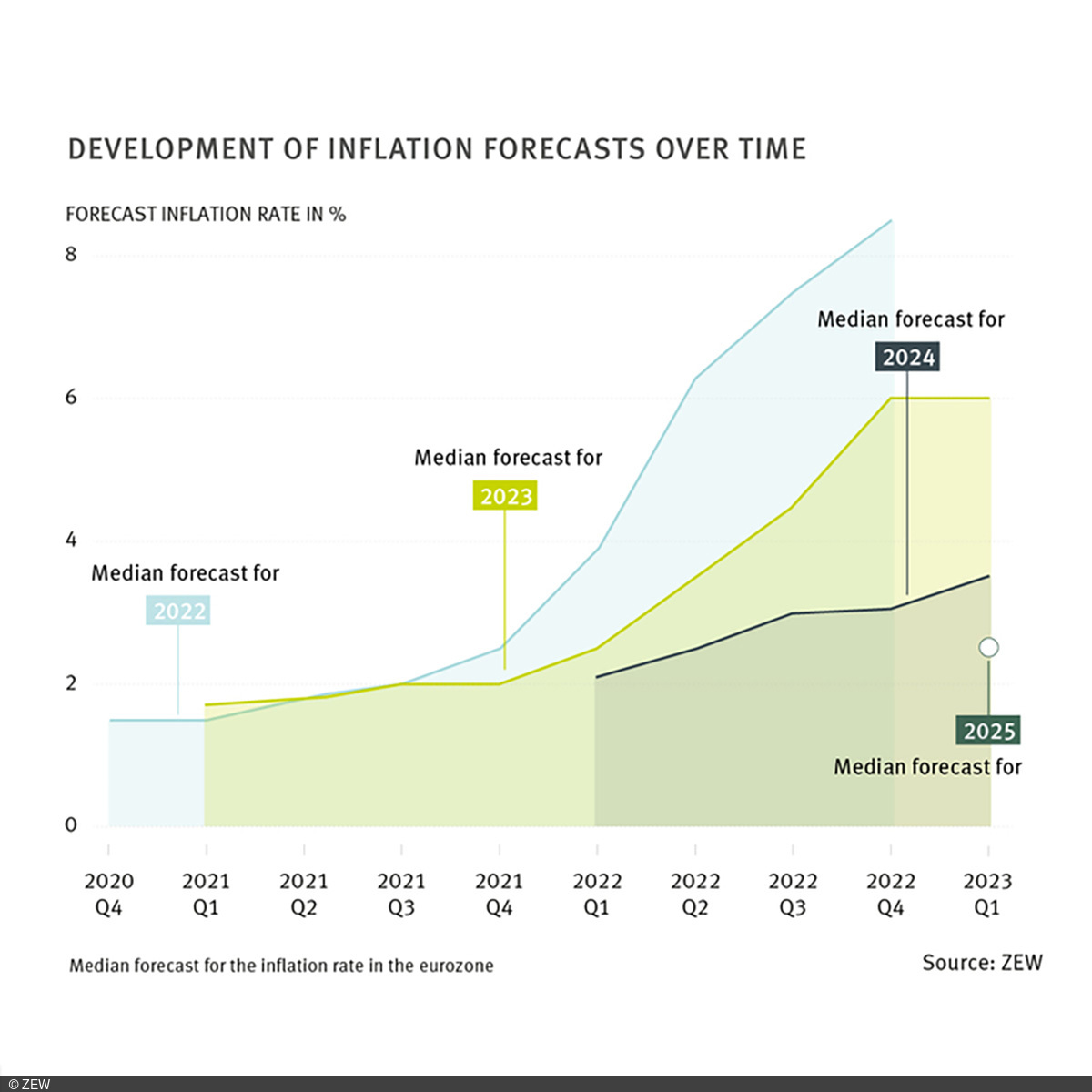Inflation and Interest Rates to Remain High in the Long Term
ResearchZEW Financial Market Survey: Special Question
In the period 2023 to 2025, the inflation rate in the eurozone is expected to exceed the ECB’s target of 2.0 per cent by a greater margin than was still assumed in November 2022. Wage developments in the eurozone have again led to higher inflation expectations among financial market experts, while energy prices have had a dampening effect. The experts assume that the ECB will raise interest rates further in the coming Governing Council meetings, and more sharply than expected in November 2022. Compared to 2022, however, the rate hikes in 2023 are not expected to be as high. For 2024 and 2025, respondents expect the key interest rate to be lowered again. These are the results of the special question included in the ZEW Financial Market Survey in February 2023, in which the respondents gave their assessment of the developments of inflation and key interest rates in the eurozone for the years 2023–2025.
In the February 2023 survey, financial market experts expect median inflation rates for 2023, 2024 and 2025 of 6.0, 3.5 and 2.5 per cent, respectively. This shows that the respondents continue to assume that inflation will slow down over time from 2023 onwards. However, the inflation forecasts for 2024 are slightly higher than in November 2022, when median inflation rates of 6.0 and 3.1 per cent were still expected for 2023 and 2024.
Wage developments fuel inflation while energy prices curb inflation
As in the November 2022 survey, the majority of financial market experts cite the development of wages and salaries in the euro area as a reason for their higher inflation forecasts in February 2023 (around 65 per cent say this had a positive or strongly influence on their forecast, compared to 60 per cent in November 2022).
In contrast to the November 2022 survey, however, participants now believe that the development of energy prices has a dampening effect on inflation. While in November 2022 60 per cent of the participants stated that energy prices had a positive influence on their inflation expectations, 65 per cent now cite this as a negative influencing factor. To a lesser extent, this also applies to the development of commodity prices (excluding energy), as around 50 per cent of participants feel that these have a negative influence on their inflation expectations (and around 30 per cent state that they have no influence), while in November 2022 around 52 per cent felt that they had a positive influence.
“Respondents again raised their inflation expectations, which are expected to remain above the ECB’s 2 per cent target at least until 2025. As in August and November 2022, they cited wage developments in the eurozone as one of the main drivers of the upward trend. This could lead to second-round effects that would reignite inflation. Against this background, the experts have also raised their monetary policy interest rate expectations for the coming years,” Thibault Cézanne, researcher in ZEW’s “Pensions and Sustainable Financial Markets” Unit, comments the results.
Click for the ZEW Financial Market Report with the complete results (in German only)
About the survey
The ZEW Financial Market Survey has been conducted since December 1991. Participants are asked monthly about their expectations concerning the development of major international economies, including Germany, the eurozone, the United States and China. In total, the panel consists of about 350 financial analysts from banks, insurance companies and selected corporations, specifically from the finance, research and economics departments as well as the investment and securities departments. Most of the participants are from Germany.
The financial experts are asked about their expectations on a six-month horizon regarding the development of the economy, the inflation rate, short- and long-term interest rates, equity prices and exchange rates. In addition, they are asked to assess the earnings situation in 13 German sectors. Besides a fixed survey section, special questions on current topics are included on a regular basis. The ZEW Indicator of Economic Sentiment, which has established itself as an early indicator of economic development (“ZEW Index”), is calculated from the expectations of financial market experts on the development of the economic situation in Germany. The results are published and analysed in detail in the monthly ZEW Financial Market Report.


